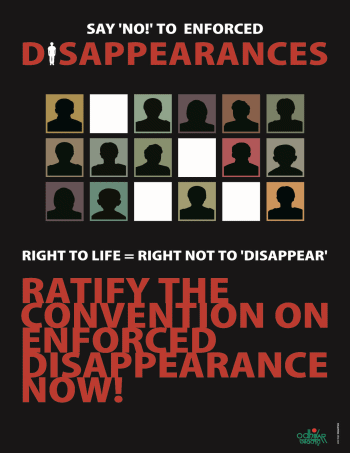Dhaka/Geneva, 26 June 2018 – On the International Day in Support of Victims of Torture, Odhikar and the World Organisation Against Torture (OMCT) wish to remember and honour the victims of torture in Bangladesh and throughout the world, and express their solidarity with, and support for, the victims and their family members.
Torture affects individuals, families and communities. It tears down the very fabric of society and represents a major obstacle to creating an enabling environment for human rights and rule of law to flourish.
In Bangladesh, torture is endemic and is routinely used by the state as a tool to intimidate, extort and suppress political opponents, dissenting voices, vulnerable groups and ordinary citizens alike. In most cases, victims are tortured and physically and psychologically abused by the police, the Detective Branch of the police, the Rapid Action Battalion (RAB), or other state agents during interrogation while in remand. Torture methods include severe beating, suspension from the ceiling, electric shocks, water-boarding, sexual abuse, threats of death, kneecapping, and in some cases mock executions.
According to data gathered by Odhikar, at least 125 persons were tortured to death by law enforcement agencies in the country from January 2009 to May 2018. It is difficult to determine the exact scale of the issue, as in many cases survivors and victims’ families keep silent for fear of reprisals and further harassment. Journalists and human rights defenders investigating torture cases are also often targets of threats and violence, amid an increasingly repressive environment for freedom of expression.
The vast majority of victims never receive justice, and perpetrators are rarely prosecuted. Despite the enactment of a new anti-torture law in 2013, which was strongly supported by human rights defenders and civil society groups, culpable state agents continue to enjoy impunity. The lack of accountability is endemic, and greatly inhibits the fight against torture and ill-treatment in Bangladesh. Odhikar and OMCT are particularly concerned by specific legal provisions which encourage a culture of impunity such as Section 132 of the Code of Criminal Procedure, which provides perpetrators with de facto immunity by stating that “no criminal complaint can be lodged against any state official without prior approval from the Government”.[1]
Furthermore, in spite of its international obligations, Bangladesh has currently not taken any steps to establish effective victim and witness protection mechanisms, nor established the necessary procedures for victims to exercise their right to complain without fear of reprisals. Victims of torture and their families often receive threats after filing complaints against law enforcement officials, and in many cases are offered money to withdraw them. In the rare case that they are able to access justice, they are confronted with a dysfunctional and non-independent judicial system.
There is a pressing need to ensure that victims’ rights are recognised. We therefore urge the government to take all necessary steps to protect victims and prevent their re-traumatization, and to ensure adequate access to social, medical or legal assistance to rebuild their lives. In this context it is particularly important to ensure that victims have somebody to turn to, including a functioning judiciary, independent and effective complaint mechanisms, and civil society organisations, without fear of reprisal, harassment or interference.
We also remind the government that the prohibition of torture is absolute and cannot be justified under any circumstances. Furthermore, the systematic failure to investigate, prosecute and punish perpetrators constitutes a serious breach of Bangladesh’s international obligations, first and foremost those under the UN Convention against Torture, which Bangladesh has ratified 20 years ago. Bangladesh has yet to submit its initial report to the Committee Against Torture.
[1] http://bdlaws.minlaw.gov.bd/
Joint Statement_26 June 18_Odhikar-OMCT (full text in English, PDF)




